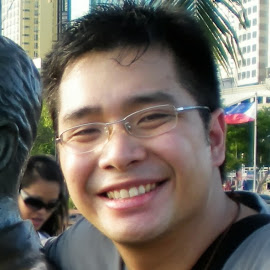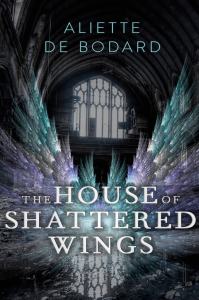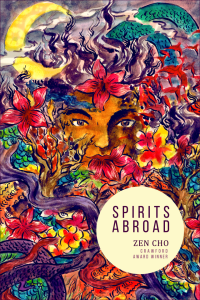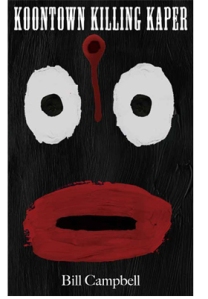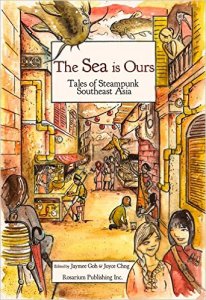The SEA is Ours is a steampunk anthology focusing on steampunk coming from South East Asia. A Rosarium project, the fundraiser campaign for this project surpassed its original goal and funded at 126% on the 29th of October this year.
I asked four authors who participated in this project to join me on the blog for a conversation focusing on the challenges South East Asian writers face. Joining me in this conversation are Paolo Chikiamco of Rocket Kapre, Dean Alfaro (also known as the father of Philippine Speculative Fiction), Kate Osias (Filipina writer), and Alessa Hinlo.
Here is the first part of our conversation. Please keep an eye out for the next part in this conversation series.
I love that while we are writers with Filipino roots, we all have come to genre from different walks of life and through different pathways. Would you like to share some of your backstory, how did you come into genre and specifically how did you become aware of publishing as a science fiction and fantasy writer? Would you like to share/talk about some of your gateway authors into genre.
Paolo Chikiamco:
Growing up, almost every story I read was either a science fiction or fantasy story, whether presented in the form of a novel or a comic, a show or a game. In the eighties and early nineties, science fiction and fantasy meant imported stories, usually from the West, with the notable exception of games and anime from Japan. The first novel I ever finished was part of a series (“The Guardians of the Flame” by the late Joel Rosenberg) and I quickly devoured that and moved on to my next series (The “Belgariad” and “Mallorean” quintets from the late David Eddings)… I actually don’t think I read a stand-alone novel until I’d devoured at least nine multi-book series from the likes of Terry Brooks, Piers Anthony, and the (now sadly out of canon) Star Wars Expanded Universe. I don’t think I’ve ever lost my preference for long stories and exhaustive world building as a reader and a writer both… I think my editors will attest to that.
The first time I ever read a genre work by a Filipino author was Arnold Arre’s “The Mythology Class” and it really opened my eyes, not only with regard to Philippine Mythology (which has become a passion of mine) but also to the idea that it was possible for people like me to write and publish the kinds of stories I loved to read. Of course, at the time I thought this was just comics, and while I dabbled in illustration, I knew I didn’t have the drive to develop that talent to the point I could make my own comics.
I was always fairly decent at writing though (or so I thought to myself). There wasn’t much of a local genre industry for me to aspire to, at least that I was aware of, but luckily the Internet became readily available in Manila soon after I became interested in writing my own stories — or maybe having the Internet would have inevitably led me to the realization that I could make my own stories. I cut my genre-writing teeth on online roleplaying games (both the play-by-post and play-by-email varieties) and fanfiction, particularly those fandoms with a healthy environment of critical feedback (that was the Evangelion fandom at the time).
I first became aware that there were Filipinos writing and publishing (prose) speculative fiction when I ran across two calls for submission: one for “A Time for Dragons” (edited by Vin Simbulan) and one for “The Digest of Philippine Genre Stories” (edited by Kenneth Yu). I was in Law School at the time, but the chance to be able to be a part of a Philippine genre publication was too enticing to pass up. My stories were accepted, and in the process of dealing with the editors, I discovered the Metro Manila based community of spec fic writers, particularly Dean and Niiki and the LitCritters, and the annual Philippine Speculative Fiction anthology (which was already on the fourth volume by then, and which had slipped under my radar entirely — one of the banes of the Filipiniana ghetto). They were very welcoming, and encouraged me even when my ambitions outstripped my resume. When I started up Rocket Kapre I had, what, three published stories at the time, and zero editing experience, but the community was very supportive: a few of the more experienced writers took me out to dinner and told me what I should expect as a new editor, how to deal with any pushback from self-proclaimed gatekeepers, and basically just to say that they had my back.
Dean Alfar:
My mother opened the trapdoor under feet by providing a diet of fairy tales and mythology books when I was learning how to read. I fell happily into other worlds, and so fantasy was my first and greatest love among the genres. Later, that expanded to include horror, scifi, whodunits, and more as I grew older: comics, AD&D rulebooks and novels, and finally magical realism when I was in college. I remember when I was young being frustrated by the selections at the local bookstore and vowing that one day I’d write my stories. There were few Filipino authored works of interest to me (no high fantasy!), but Philippine mythology and especially folklore were things I cherished when I came upon them (rarely were they interestingly written). In university, I began to write – plays first, then fiction. I got stories published in local magazines, won a few prizes, and I thought that was that. I learned to write by reading and writing. I was not part of academe, though later my work would win my fellowships in various national-level writing workshops.
Until I was inspired by Christopher Barzak’s “Plenty” in the Year’s Best Fantasy & Horror. I loved it and saw it was published in Strange Horizons, an online venue that seemed less impossible to submit to than the print magazines. I submitted “The Kite of Stars” and made my first professional sale in 2003. Later, it was reprinted in YBF&H – which rocked my world. It showed me that it was possible for someone like me – a maverick, non-academic, non-white person to get published abroad. And if it was possible for me, then it was therefore possible for other Filipinos.
From there, I began the Philippine Speculative Fiction annuals, which are meant to help create space for speculative fiction in our country. I paid for everything out of pocket, as an independent print publisher, finally making the switch to digital format with Volume 6 of the series. I learned the ropes by doing things mtself. I began as the sole editor of the series, then was later joined by Nikki Alfar, and later (after we instituted rotating editors to prevent only a particular aesthetics or poetics from determining what was published) by Kate Osias, Alexander Osias, Vincent Simbulan, Andrew Drilon, and Charles Tan. I’m happy to share the fact that we have published many first time authors, as well as authors who would later write more and more and get published in other venues. Since 2005, we have published 11 volumes (10 annuals plus a “Best of Philippine Speculative Fiction”).
We also founded the LitCritters, which functioned as a form of workshop for speculative fiction authors. We have always been open and supportive of the writers of our genres, though this workshop has not been held with regularity in the past couple of years.
Oh – and as a spec fic author, my modern gateway authors into the kind of fiction I like to read and write include Chris Barzak, Jeffrey Ford, Kelly Link, Ted Kosmatka, and Gabriel Garcia Marquez.
Kate Osias:
I was fortunate to grow up in a family who had a healthy respect for fiction. (As an aside, my father chose my nickname from his favorite Sydney Sheldon book, Master of the Game.) To top it off, I went to a school that believed passionately in literature. Between my family and school, I had access to Sidney Sheldon, Robert Ludlum, Gabriel Garcia Marquez, Shakespeare, Nick Joaquin and Ayn Rand, just to name a few. And because my family believed reading was important regardless of genre or topic, they also allowed me to buy all the Nancy Drews, and Sweet Valley Twins/Highs, Goosebumps, and fantasy novels that caught my fancy. I never actively labelled my choices as ‘genre’ or not ‘genre’ and, and the authority figures in my life never really made me feel bad about any of my choices. (Although I do know that one of my [Catholic] Lit teachers was mildly distressed that I had read Judith Krantz’s Princess Daisy even before sex was discussed in class.)
I lost ‘literature’ when I got to college, which is my overly dramatic way of saying that there just wasn’t time to indulge in it. Literature wasn’t a pre-requisite for the accountancy course I was taking, and between trying not to fail my major, rebelling, falling in love, and having my heart broken, it was hard to make book browsing a priority.
Fast forward to several years later. My then boyfriend (now husband), Alex Osias, introduced me to several of his friends. His friends became our friends and we all became so close that, a decade and some odd years later, we still see each other every week. Out of this friendship, the LitCritters was born.
Nearly everything I know about writing and publishing I learned from the LitCritters. The group was led by Dean Alfar, who was already an established writer then. Along with his wife Nikki, two other friends Vincent Simbulan and Andrew Drilon, and of course my husband Alex, we strove to learn the writing craft by reading. Dean took on the huge task of selecting three to four stories every week based on a theme, designing lectures, providing parameters for the occasional writing challenges and moderating the discussions. We had the responsibility of reading the stories, writing critiques (not academic ones, mind you) and essentially stay critically aware even if the story bored us to death.
I can’t emphasize enough how significant the LitCritters was for someone like me, who never really took a formal class on writing or literature, aside from the ones provided by my high school. For one thing, it was really the first time I was immersed in the short story form. For another, this was my formal introduction to Speculative Fiction. Every week for several years, we read stories we liked and hated, and loved, and completely abhorred or were bored with, all while being forced to think critically of what made stories work and what didn’t. Sometimes, we all agreed. Most of the time, we argued and pleaded and got annoyed with each other for obviously not seeing how good/how bad the story was. These discussions, along with Dean’s lectures, are where I learned and defined my own poetics.
Apart from the reading, we also of course did writing challenges. The story I have in The SEA is Ours: Tales of Steampunk Southeast Asia, The Unmaking of the Cuadro Amoros, was actually written because of the steampunk challenge two years ago.
Alessa Hinlo:
My family immigrated to the United States when I was a toddler and during those early years, my grandmother lived with us. She used to be a teacher in the Philippines, so she thought it was very important to instill a love of reading and writing in me. She was my biggest fan. She’d read all the stories I wrote for school and pointed out bits of description and pieces of dialogue she loved. That encouragement was great to have early in life, because neither of my parents are big fiction readers. They approved of my reading habit since it was an “intellectual” hobby and kept me out of trouble, but it wasn’t something they did themselves. As for the writing, they meant well but they just didn’t get it. Writing for school assignments made sense because it was an academic requirement, but writing just because I had a story in my head I wanted to tell? That was harder to understand.
Even though I’ve been devouring books for about as long as I can remember, I’d say that my first introduction to SFF as a genre were the Choose Your Adventure books. I used to eat those books up and whenever I’d see a new one at the library, I’d immediately check it out. They don’t immediately seem like SFF in the traditional sense but if you stop to think about some of those endings — you get turned into a cat, a monster appears and eats you, you walk through a portal into the past — they’re 100% speculative. Maybe only the bad endings were, but since I always ended up choosing those routes, that’s what it ultimately looked like to me. In terms of formative novels, my first true exposure was through teen horror and thrillers via Christopher Pike and Lois Duncan. From there, I’d move on to L.J. Smith — and let me tell you, it was a trip to see Vampire Diaries become a hit TV show when I read those books 20 years ago! Fantasy-wise, a friend introduced me to Mercedes Lackey in middle school and her Valdemar series carried me through my high school years. Those books really captured the angst of a misunderstood, alienated teenager, telepathic white horses and all.
The funny thing about my writing is that although I’ve written stories for a good chunk of my life, I never really considered publishing as a viable thing for the longest time. That’s not something you do as an Asian-American immigrant, and especially not as the child of one. You’re supposed to get a “practical” job. Writing? Publishing? That was for other people, not me. I even say this as someone who wrote her first novel in high school (it was an epic fantasy that was heavily inspired by David Eddings and anime) and had multiple friends who, after having read said novel, asked me if I’d ever thought about pursuing publication. My answer inevitably would be: No, why?
Seeing oneself clearly can pretty hard sometimes.
I made some initial attempts at submitting a few short stories in my 20s. Even wrote a couple novels, but I went through a rough patch and took a break from writing. But things eventually got better, and I tentatively took up writing again about 4 years ago. My short story in The SEA Is Ours is the first short story I’d written and submitted during this “new” time.

